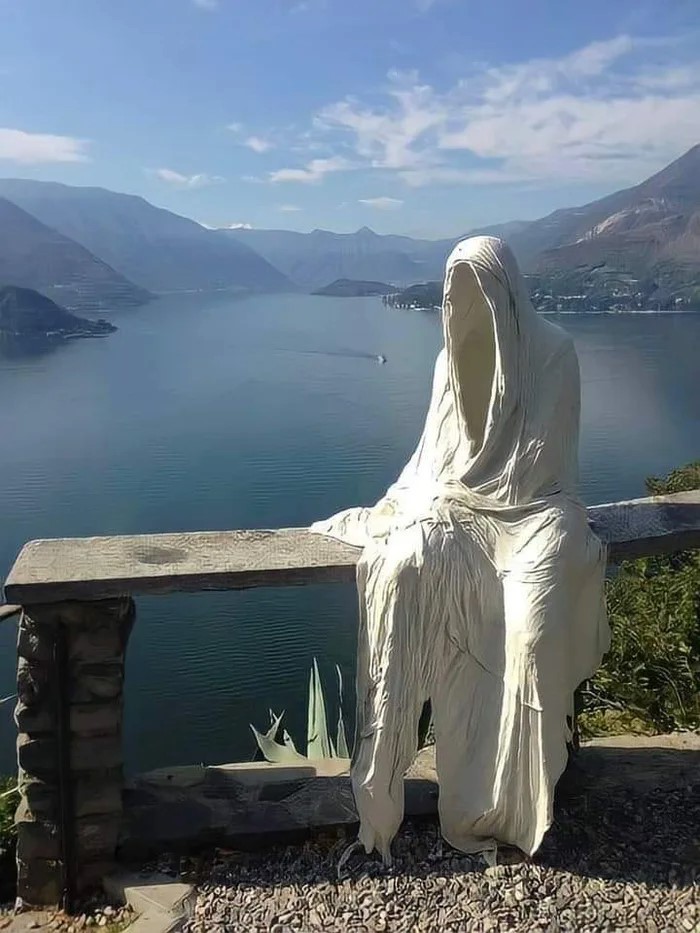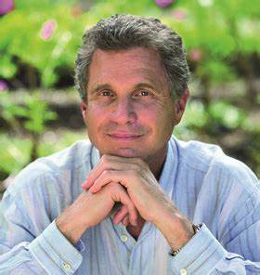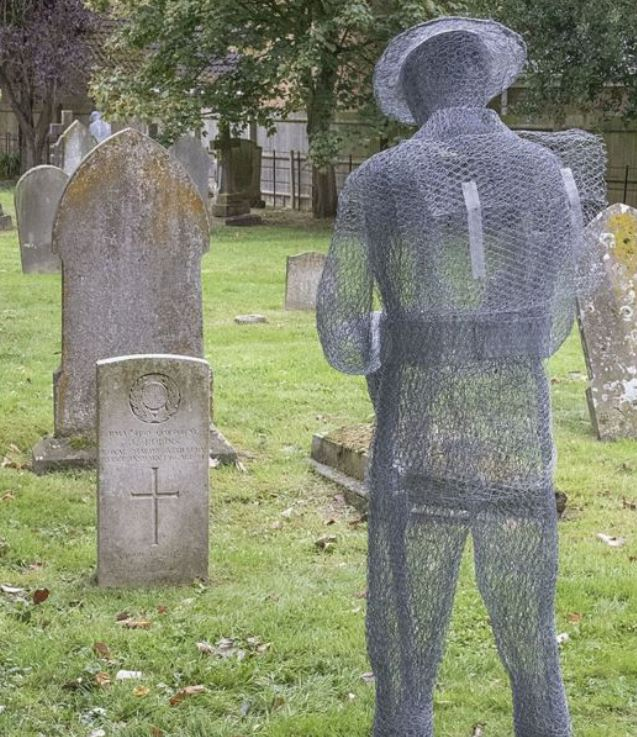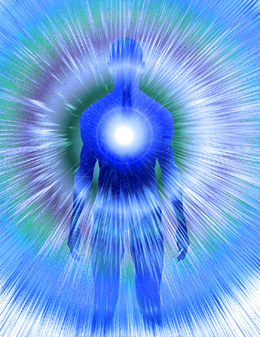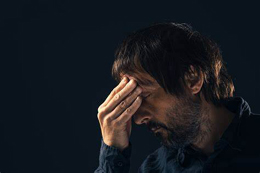Think it Over
Wider Collateral of War: Spiritist Effects on Human Well-being
Abstract
The author proposes that war and trauma have multiple side-effects. They directly damage not only soldiers, their ‘victims’ and descendants, but also the wider population indirectly as collateral. People who are psychic, clairvoyant, or mediums may deliberately or accidentally tune into spirits of the unquiet dead, killed in war, while people in the general population who are sensitive, may energetically ‘pick up’ or spontaneously access the trauma of entities or ghosts who don’t know they are dead. Another side-effect: the Mother suggested a relationship between entities (the unquiet dead) and virus-like illnesses in populations. The unquiet dead (in the form of unsettled entities) may also negatively impact mental distress, in addition to a person’s mundane life trauma. According to different cultures across the world, mental distress has many triggers, interpretations, and ‘symptoms. Furthermore, treatments for mental distress depend on the beliefs of a sufferer, those around or caring for them, or in authority nearby. There are multiple narratives.
PTSD effects of war on soldiers
The solutions for mental distress require compassion and a deeper understanding of consciousness. However, we propose solutions exist beyond medicine, health care and psychiatry, beyond medical schools and their deaneries, beyond hospitals and clinics.
Let us start by exploring the material reality effects of war and its occult effects. We note that studies by Abdul-Hamid and Hughes (1) reveal ancient Assyrian soldiers returning home from combat 3,000 years ago suffered PTSD (Post Traumatic Stress Disorder). a Laura Clark, a writer for The Smithsonian Magazine claims that, “... the correlation between war and post-traumatic stress is likely as old as human civilization.” The sorts of symptoms after battle were very clearly what we would call now post-traumatic stress symptoms. [Soldiers] “described hearing and seeing ghosts talking to them, who would be the ghosts of people they’d killed in battle — and that’s exactly the experience of modern-day soldiers who’ve been involved in close hand-to-hand combat (2).” Professor Lendon, of the University of Virginia, explored the history of warfare in his book, Soldiers and Ghosts (3), with its required obedience, discipline and killing.
Cultural insights around ghosts
The discipline of medical anthropology claims there are always multiple narratives around human illness causation.We suggest a deeper understanding of spirits and hungry ghosts may enable our society to better acknowledge mental ill health and distress and its relationship with trauma and war. Of course, the explanatory models we humans hold for causes of illness and mental distress are like ‘Liquorice All-Sorts’: we choose whichever models fit with our current beliefs. In order to expand on this topic, we consider the writings of the Mother of the Sri Aurobindo Ashram, plus insights from psychiatrist, Dr. Soumitra Basu; medical anthropologist and shaman Dr. Alberto Villoldo; and additional research from South America and Africa.
The Unquiet Dead
According to psychologist Edith Fiore (4), the unquiet dead are spirits of people who die suddenly, who do not know they’re dead. Kardec suggests they may roam around on Earth’s plane, and may attach to the living, causing illness and mental distress (5). It is possible hungry ghosts (or the unquiet dead) are a wider collateral of war, alongside human diseases and viruses they may enable. Physician Gabor Maté (6) used the term ‘Hungry Ghosts’ as a metaphor for people who were addicted, who had an insatiable yearning, but could never be satisfied. However, it is probable the term is not a metaphor for peoples elsewhere in the world, who are spiritist, aware of actual spirits of the dead, who are acquainted with unsettled hungry ghosts. Ghosts as non-physical entities are familiar to populations in the East, among Indigenous Americans, Aboriginal Australians, and in Africa.
Ghosts in Eastern cultures
Ghosts found in Chinese and Vietnamese Buddhist cultures represent non-incarnate beings, driven by intense emotional needs. Hungry-ghosts are described in Buddhist, Taoist, Hindu, Sikh, and Jain texts as remnants of the dead who are afflicted with insatiable desire, hunger or thirst, as a result of bad deeds done during their lifetimes. They are also found in every part of the Far East, from the Philippines to Japan and China, Thailand, Laos, Burma, India and Pakistan (7). The value judgment about ‘bad deeds’ is not found in Western spiritist groups: they are simply beings who are unsettled, have not been buried or prayed over.
The Mother’s insights on war and virus
The Mother, Mirra Alfassa, had deeply clairvoyant skills, and when she visited Japan in 1919, she received psychic insight about a virus inflicted upon the population there. She wrote, “I saw clearly a being, with a part of the head cut off, in a military uniform (or the remains of a military uniform) approaching me and suddenly flinging himself upon my chest…” This ghost of a deceased soldier made her extremely sick. She continued:
“I had understood that the illness originated from beings who had been thrown out of their bodies. I had seen this during the First Great War, towards its end, when people used to live in trenches and were killed by bombardment. They were in perfect health, altogether healthy and in a second, they were thrown out of their bodies, not conscious that they were dead. They did not know they hadn’t a body anymore (8).”
Pondicherry psychiatrist, Dr. Soumitra Basu suggested there was an underlying assumption in Western traditions that people’s health was only influenced by post-natal experiences, rather than by past lives, planetary, karmic, para-psychological or supernatural influences. He proposed the virus was a gateway through which hostile forces may invade individuals and populations, and that there were occult forces behind the Covid-19 pandemic (9).
Insights from Japan
According to traditional Japanese beliefs, all humans have a spirit or soul and when a person dies, it leaves the body,then waits for funeral rites to be performed. so it may join its ancestors. If this is done appropriately, it becomes a protector of the living family. However, the situation is not the same if a person dies in a sudden or violent manner. Yūrei, spirits or ghosts, can be found in graveyards, or near a place where death happened. They keep clothing they wore when they died, including their uniform as fallen warriors (if they didn’t receive proper funerals). They may haunt a place or a person, be reluctant to accept their death, and can bring misfortune on others. Sociology researcher Yuka Kudo, studied the phenomenon of phantom taxi passengers: she interviewed 100 taxi drivers about ghostly encounters they’d had in the aftermath of the 2011 earth-quake disaster (10).
Two insights from South America
Medical anthropologist, Dr Alberto Villoldo informs us that the visible and invisible worlds are inextricably intertwined:
“The shaman does not believe in a division between the body and the spirit, or between the visible world of form and the invisible world of energy”.
He continues, “There is no difference between being killed by a jaguar and being killed by a microbe. To Westerners, being killed by a microbe is an illness, whereas being eaten by a jaguar is an accident, pure bad luck. In the West we have a disease-care system, and medicine recognises thousands of ailments and myriad remedies. One-Spirit Medicine, on the other hand, is a healthcare system that identifies only one ailment and one cure. The ailment is alienation from our feelings, from our bodies, from the earth, and from Spirit (11)”.
A similar view was supported by anthropologist, Gerardo Reichel-Dolmatoff who noted the concept of illness and disease in Colombia, was closely related to environmental sustainability. Sickness served as a mechanism to enforce rules about ecology (12).
Insights from Africa
British anthropologist, Victor Turner noted when people became ill, their first explanation was ancestral spirits had been disturbed. Sickness was also caused if a taboo was broken, or by quarrelling with kin. During public ritual to release a man from troubling ancestral beings, the Ndembu villager spoke all his troubles aloud. During the ceremony, it was socially acceptable for secret grudges and hidden animosities within the community to be voiced. A person could not get better until all the villagers’ tensions had been expressed or confessed. Speaking private matters in public allowed the angry spirit, which caused the sickness, a gateway to leave (13).
Summary of Insights around ghosts
The case studies above from India, Japan, South America, and Africa, illustrate it is normal for people of many cultures and faiths to see ghosts or spirits. If deceased people are not prayed over appropriately, nor buried, ghosts do not turn into ancestors, to be venerated, or reborn. They remain wandering the earth’s plane, influencing living humans’ mental and physical well-being. This problem of the unsettled and unquiet dead is particular to war killings.
Solutions for addressing war, ‘othering’ and human wellbeing are to be found at political, national and international levels. ‘Othering’ is the practice of deliberately or unconsciously identifying oneself, in opposition to other people, in terms of skin colour, religion, faith, language, class, political views, territory and resources. It is one of the key factors in maintaining war and promoting discord between peoples. In the past we humans only knew who we were in opposition to an ‘other’, supported by politicians and government leaders. This practice of othering has to stop.
Treatment strategies
Spirits of people, who die suddenly and do not know that they are dead, may roam around in the Earth’s plane and attach themselves to living people, causing mental distress and fear of virus. This means war collateral is wide: a deeper understanding of spirits and hungry ghosts might enable humans to better acknowledge sources for their behaviour, illness, distress and death. The proposition set out above is that war and trauma resulting from killing has multiple side effects: not only are soldiers, their victims and descendants directly damaged by war, but also the wider population are indirectly damaged as collateral. There are living people, including sensitives, shamans, psychics or mediums, who may spontaneously access the trauma of earthbound entities and ghosts, exacerbating any mental health problems they may have had. There are people who may fear virus-like illness.
Occult triggers of distress
It is possible some people who have mental distress today, are responding to: trauma from their current life; trauma from a previous incarnation; or tuning into a remote scenario, experiencing extreme empathy. Living people may spontaneously access the trauma of earthbound entities, exacerbating any mental health problems. In addition, practitioners skilled in remote viewing, may project imagery onto vulnerable individuals’ minds, influencing them to cause harm to ‘others’, against their customary free-will (14). While humanity fights over territory, beliefs, resources, and upholds supremacism, it feels like humans are damned, unless we learn how to stop ‘Othering’ and making war.
The problem in the West
Not everyone in the West acknowledges the existence of a spiritual dimension, nor that some living human beings slip into them, or access them unintentionally, get distressed, and then maybe get diagnosed with mental disorder. We don’t often acknowledge gifted specialists like clairvoyants, shamans, or psychics who slip into and out of other dimensions at will. Nor do we acknowledge that some people may deliberately create thought-forms to manipulate vulnerable people, for political ends. Writer, Mark Stavish describes thought-forms as egregores, and suggests some are hungry ghosts which feed on human fear (15).
Multiple narratives: spiritism and mental distress
Many people in the west tend to ignore spiritism. However, our personal beliefs are important: they inform the way we interpret experience, our theories of illness causation and influence our health seeking strategies for mental wellbeing, our access to health care and our acceptance of diagnosis and treatment. For decades in the UK, Australia and USA, the dominant model for extreme mental distress was assumed to be biomedical, and we mistakenly assumed our diagnoses and treatments were transferable throughout the world. But we were wrong (16, 17, 18). Practitioners are more aware today their bio-medical training doesn’t fit the current zeitgeist, and many are starting to question the original diagnoses of their professions (19).
Changes are starting to happen
In 1992, the International Spiritist Council was set up to support awareness of expanded consciousness in different countries: the International Spiritist Medical Association is supported by Brazilian psychiatrists (20), and the British Spiritist Medical Association is chaired by a psychiatrist. The British Medical Journal reprinted an article titled, ‘Drop the language of disorder’ (21), and the Council for Evidence Based Medicine earlier published a report on, ‘Unrecognised Facts about Modern Psychiatric Practice’. The practice of group discussion with consent has recently taken off throughout Western countries (22), although for millennia, it was a normal practice for addressing distress by a council of elders in African countries, and in the USA, New Mexico elders had sacred spaces (kiva) where they performed ceremonies and held healing discussions.
A wider treatment strategy is to challenge human behaviours: to stop creating war; stop creating spirits of beings who don’t know they are dead; stop ‘othering’ other people, or desiring their territory or environmental resources; stop creating weapons of war and destruction. It is not enough to treat mental distress on its own and still sell weapons for mass killing of people. We need to rethink our human morality, and adopt multiple responses. We need to stop violence, acknowledge the damage war does to humans and discarnate beings, and offer prayers to honour everyone alive and in spirit, so they become ancestors. Let us work together.
Human crisis experiences and mental distress are caused both by trauma in our present incarnation, and by trauma reaching us from dimensions beyond. But where do we go from here? Many psychiatrists have shifted their thinking about mental health, but now we, the population, must go beyond our mundane reactions to distress. As well as solutions with healthcare, medical schools, psychiatry, educational deaneries, hospitals and healthcare clinics, we must go beyond to explore spiritual aspects of consciousness. We must address ‘Othering’ and war with its human and spiritual collateral at a political government level, and national and international levels. It is essential we collaborate to explore multiple solutions.
References
1. Abdul-Hamid WK, Hacker Hughes J. [Online] Nothing new under the sun: post-traumatic stress disorders in the ancient world, Early Science and Medicine; 2014 https://pubmed.ncbi.nlm.nih.gov/25577928/ [Accessed 2nd Aug 2022].
2. Clark L. Ancient Assyrian Soldiers Were Haunted by War, too. The Smithsonian Magazine, Washington; 2015. https://www.smithsonianmag.com/smart-news/ancient-assyrian-soldiers-were-haunted-war-too-180954022/ [Accessed 2nd Aug 2022].
3. Lendon JE. Soldiers and Ghosts: A History of Battle in Classical Antiquity. New Haven CT: Yale University Press; 2006.
4. Fiore E. The Unquiet Dead. New York: Ballantine Books; 1991.
5. Kardec A. The Gospel According to Spiritism. USA: US Spiritist Council; 2020.
6. Mate G. In the Realm of Hungry Ghosts: Close Encounters with Addiction. Toronto Canada: Vermilion; 2018.
7. Heaphy L. [Online] Hungry Ghosts: Their History and Origin – Kashgar; 2018. Available from: https://kashgar.com.au/blogs/tribal-culture/hungry-ghosts-their-history-and-origin [Accessed 2nd Aug 2022].
8. The Mother. The Collected Works of the Mother. Volume 5. Cent ed. Pondicherry: Sri Aurobindo Ashram Trust; 1976, pp. 182-85..
9. Basu S. Meditations on the Current Pandemic, NAMAH July 2021; 29:2: 33-36. http://www.namahjournal.com/doc/Actual/Meditations-on-the-current-pandemic-vol-29-iss-2.html [Accessed 2nd August 2022].
10. Palace S. [Online] “Ghost Passengers” Haunted Japanese Taxi Drivers after the 2011 Tsunami; The Vintage News; October 2020. Available from: https://www.thevintagenews.com/2020/10/20/ghost-passengers [Accessed 2nd Aug 2022].
11. Villoldo A. [Online] Shamanic Wisdom Revealed – Medicine For The Future; Heal Your Life 2015. https://www.healyourlife.com/shamanic-wisdom-revealed-medicine-for-the-future [Accessed 2nd Aug 2022]
12. Reichel-Dolmatoff G. Rainforest Shamans: Essays on the Tukano Indians of the Northwest. Dartington UK: Themis Books; 1997.
13. Turner V. The Drums of Affliction: A Study of Religious Processes among the Ndembu of Zambia. Oxford: Clarendon Press; 1968.
14. Buchanan L. [Online] Remote Influencing - A Controlled Remote Viewers Guide; 2014. Available from: https://www.youtube.com/watch?v=-8EdGxtCx5E [Accessed 29 July 2022].
15. Stavish M. Egregores, Inner Traditions. Vermont US; 2018.
16. Fernando S. Mental Health Worldwide: Culture, Globalization and Development. London: Palgrave Macmillan UK; 2014.
17. Mills C. Decolonizing Global Mental Health: The Psychiatrization of the Majority World. London: Routledge; 2014.
18. Watters E. Crazy Like Us: The Globalization of the American Psyche. Melbourne: Scribe Publications; 2010.
19. Moncrieff at al. [Online] The serotonin theory of depression: a systematic umbrella review of the evidence; https://pubmed.ncbi.nlm.nih.gov/35854107/ 2022 [Accessed 2nd Aug 2022].
20. The International Spiritist Medical Association. [Online] https://sma-international.org/ ) [Accessed 2nd Aug 2022]
21. Kinderman P et al. Drop the language of disorder [Online], BMJ Evidence-Based Mental Health; 2013. 16:2-3. http://ebmh.bmj.com/content/16/1/2.full [Accessed 2nd Aug 2022].
22. Seikkula J, Olson M. [Online] Therapists’ Responses for Enhancing Change Through Dialogue: Dialogical Investigations of Change. In: Borcsa M, Rober P (eds). Research Perspectives in Couple Therapy. Cham, Switzerland: Springer; 2016. https://link.springer.com/chapter/10.1007/978-3-319-23306-2_5 [Accessed 2nd Aug 2022].
Dr. Natalie Tobert is a medical anthropologist and author based in the United Kingdom.
Share with us (Comments,contributions,opinions)
When reproducing this feature, please credit NAMAH,and give the byline. Please send us cuttings.


